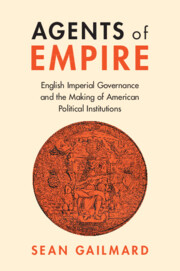‘With this pioneering study, Sean Gailmard shows us that to understand the American institutional inheritance of elected legislatures with decentralized autonomy, we need to hearken back to the challenges faced by the English Crown from Jamestown forwards as it sought to extend colonial rule with limited resources. A must read for anyone interested in comparative political development.’
David Stasavage - New York University
‘We all learned (or took for granted) that the origins of America’s institutions lay in its founding documents such as the Constitution and The Federalist Papers. But in this provocative and field-changing work, Sean Gailmard asserts that America’s institutions have deeper precedents. Analyzing the historical record through the lens of modern political economy, Gailmard shows that some of the most distinctive features of the American political system, such as separation of powers and judicial review, trace their origins to the institutions that the British crown created to resolve agency problems in its 17th century New World colonies. The prevailing narrative that resides in our history and social studies textbooks will have to be updated in response to the evidence and analysis presented in this book.’
Avidit Acharya - Professor of Political Science, Stanford University
‘With diligence and rigor, Sean Gailmard demonstrates the imperial origins of arrangements at the core of the American democratic republic - representative assemblies, separation of powers, judicial review. Combining imaginative formal models with broad historical research into institutions that scholarship has largely forgotten, Agents of Empire breathes new life into American political development.’
Daniel Carpenter - author of Democracy by Petition: Popular Politics in Transformation, 1790–1870
‘This brilliant book poses questions we have failed to ask, answers them compellingly, and jump-starts debates we'd benefit from. Along the way, Agents of Empire integrates the study of political development into the mainstream study of U.S. politics, and shows us how British North America should inform debates about comparative political and economic development. A triumph!’
Robert Mickey - University of Michigan
‘[A] welcome addition for graduate students and faculty. Recommended.’
J. L. Wallace
Source: CHOICE



